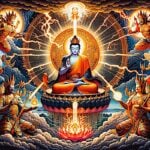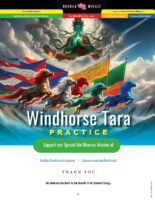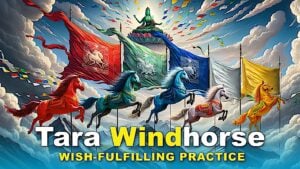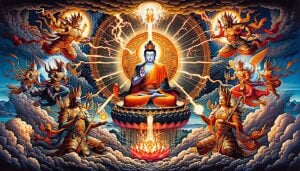Four Questions the Buddha Would NOT Answer and Why: Is the Cosmos Finite in Space?; Is the Universe Finite in Time?; Is the Self Different From Body?; Does the Buddha Exist After Death?

Shakyamuni Buddha is arguably the most quotable person in history, with millions of words contained in thousands of sutras. Regardless of the topic, we take it for granted there’s a “Buddha quote” to fit. Or — perhaps not.
It may surprise some Buddhists that there were four big cosmic questions the Buddha refused to answer.
The four questions could be translated into modern English as:
-
Is the cosmos finite in space?
-
Is the universe finite in time?
-
Is the self the same or different from the body?
-
Does the Buddha exist after death? (Since He has achieved Nirvana.)
The Impossible Questions: Cula Malunkyovada Sutta
In fact, there’s a sutra (sutta in Pali) dedicated specifically to these four questions he refused to answer: Cula-Malunkyovada Sutta, so called because Venerable Malunkyaputta asked the questions of Buddha. In fact, he went so far as to say that if Buddha would not answer these questions, he would renounce his training. [The full Cula-Malunkyovada Sutta appears at the end of this feature.][1] (The four questions are often stated as fourteen or ten, but this is only because Malunkyovada gave true/false, both true, neither true logic variants.)
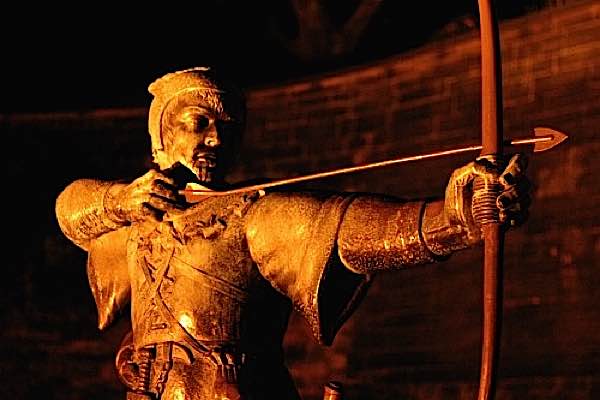
Did Venerable Malunkyaputta renounce when Buddha refused to answer? The sutra makes it clear that Buddha declined to answer — not that he could not answer. He considered the questions unimportant.
Today, we still wrestle with these cosmic questions, vast topics that still keep scientists and theologians struggling for answers. So, why did Buddha dismiss them as insignificant? Why did he refuse to even utter one word, not even a “yes” or “no.”?
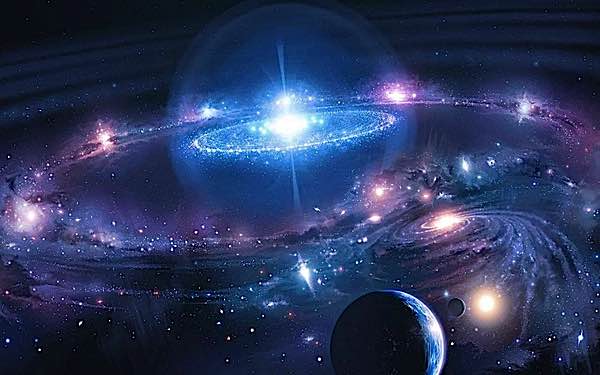
Not answering — that is an answer in itself. They weren’t “impossible” because there were no answers, but because to answer would have itself been the wrong answer.
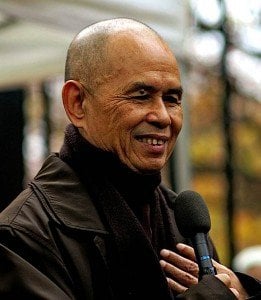
Thich Nhat Hanh, in a commentary on the Sutra, explained:
“The Buddha always told his disciples not to waste their time and energy in metaphysical speculation. Whenever he was asked a metaphysical question, he remained silent. Instead, he directed his disciples toward practical efforts.”
Thich Nhat Hanh continued, “Questioned one day about the problem of the infinity of the world, the Buddha said, “Whether the world is finite or infinite, limited or unlimited, the problem of your liberation remains the same.” Another time he said, “Suppose a man is struck by a poisoned arrow and the doctor wishes to take out the arrow immediately. Suppose the man does not want the arrow removed until he knows who shot it, his age, his parents, and why he shot it. What would happen? If he were to wait until all these questions have been answered, the man might die first.” Life is so short. It must not be spent in endless metaphysical speculation that does not bring us any closer to the truth.” [2]
How Buddha Answered Malunkyaputta
The Buddha’s reason for not answering these provocative questions is straight forward enough:
“So, Malunkyaputta, remember what is undeclared by me as undeclared, and what is declared by me as declared… And why are they undeclared by me? Because they are not connected with the goal, are not fundamental to the holy life. They do not lead to disenchantment, dispassion, cessation, calming, direct knowledge, self-awakening, Unbinding. That’s why they are undeclared by me.”
In other words, they simply had nothing to do with Buddha’s teachings on the cessation of suffering. Buddha makes that even clearer when he tells Malunkyaputta, emphatically: “And what is declared by me? ‘This is stress,’ is declared by me. ‘This is the origination of stress,’ is declared by me. ‘This is the cessation of stress,’ is declared by me. ‘This is the path of practice leading to the cessation of stress,’ is declared by me. And why are they declared by me? Because they are connected with the goal, are fundamental to the holy life. They lead to disenchantment, dispassion, cessation, calming, direct knowledge, self-awakening, Unbinding. That’s why they are declared by me.”
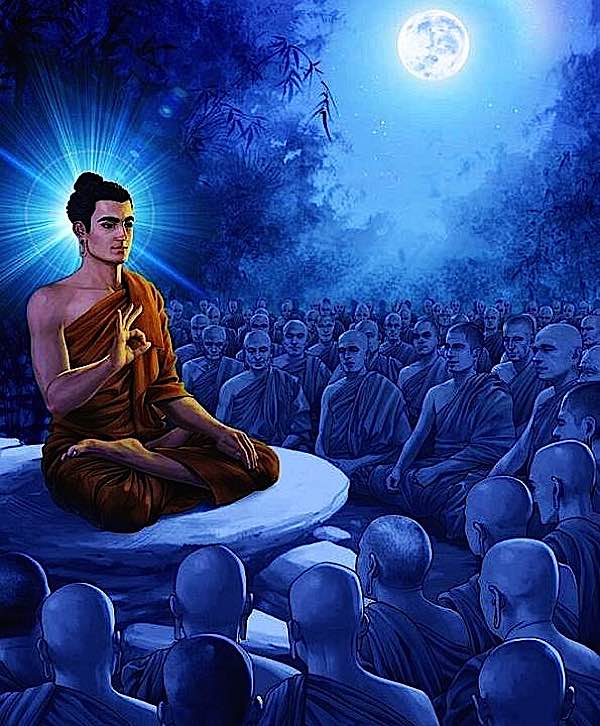
The Trap of Dualism
One likely reason often cited as to why the Buddha would not answer is that any answer — regardless of what those answers were — would reinforce dualism: me-you, space-time, object and subject. So, Buddha not only left his answers “undeclared” because they have no benefit to practice, but also because they might actually set-back practice with notions of duality.
Buddha Nature, as expressed in Mahayana Sutras, is inherent to all of us, and is non-dualistic. In Zen this is often expressed as Oneness. In Sutra there is the doctrine of Anatta (non-self).
Malunkyaputta’s questions are all dualistic. He even expressed them this way. For example, he asked “Is the world eternal, or not?” — almost binary in its dualism. The very choices were dualistic in nature. They speak to relative reality. Clinging to relative reality and duality is one of the causes of our suffering.

Grasping for Infinity — Another Form of Clinging
In fact, the four big questions provoke thoughts of clinging and attachment. Why is it important that space or time are infinite? Do we want to feel like a part of us will exist forever? The question of self also stems from attachment — to a permanent, independent self. If so, we are feeling the very sense of attachment that Buddha taught us to overcome. Buddha taught Anatta (not-self). These questions would provoke attachments rather than help us relinquish them.
Perhaps the biggest attachment of all, for Buddhists, is to the notion that the Buddha, once liberated and Enlightened, exists after death. Clearly, the Dharma survived Tathaghata’s passing. So, if Buddha doesn’t exist dualistically after death, then, what are we bowing to when we approach an altar with an image of Buddha? If we pray to Buddha, who are we praying to? Out of respect we are bowing to what Buddha represented. Ultimately, we are bowing to the Buddha within ourselves, our own Buddha Nature. If we are Mahayana Buddhists we may be bowing to a Bodhisattva — an Enlightened Buddha who does not pass beyond — but not in the supernatural self-aware sense, since Mahayana Buddhism strongly emphasizes Oneness, or Emptiness. At a non-dualistic level we are also bowing to Oneness, the Oneness that is all things (the very complicated concept of Emptiness) — and all things does include the Buddha, ourselves, every atom in the “infinite” or the “non-infinite” universe (whichever it is.)
Infinite Space Example: Attached to Infinite “Me”
It was once thought the universe is finite and expanding from the big bang. New theories have it that there was something before the big bang. Most people think in terms of “infinite space.”

But what would infinite space really mean? It would mean, as pointed out on a Fraser Cain piece in Universe Today, that there are infinite numbers of “you’s” in the Universe. That you are infinite, too. And, if that’s the case, then the worry of attachment is very real. It can be reassuring to the point of attachment to think there are infinite me’s in the Universe, that those me’s will never end. Clearly, knowing this, is not helpful in the context of the cessation of suffering. Excited by the possibility of infinite me’s, we would cling to the hope of immortality.
Here’s the qutoe from the episode, “Is the Universe Finite or Infinite”:
“There are only 10 ^ 80 particles in the observable Universe, so that’s much less than the possible configurations of matter in a cubic meter. If the Universe is truly infinite, if you travel outwards from Earth, eventually you will reach a place where there’s a duplicate cubic meter of space. The further you go, the more duplicates you’ll find.
“Ooh, big deal, you think. One hydrogen pile looks the same as the next to me. Except, you hydromattecist, you’ll pass through places where the configuration of particles will begin to appear familiar, and if you proceed long enough you’ll find larger and larger identical regions of space, and eventually you’ll find an identical you. And finding a copy of yourself is just the start of the bananas crazy things you can do in an infinite Universe.” [3]
Infinite Time: New Theories of “Infinite Sequence of Time”
Oxford mathematician Marcus du Sautoy, echoing the “rumblings in the cosmological corridors”, explains that there may have been time before the Big Bang — contrary to the commonly accepted theory that the Big Bang started the cosmological clock.
New theories are putting forward notions of countless eons of time — a phrase you hear often in Mahayana Sutras, interestingly. Marcus du Sautoy, author of The Great Unknown, puts it this way: ” “it looks like time is going to run out and stop and each of these beginnings and ends might be able to be glued together to make an infinite sequence of time.” [4]
If, like space, time is infinite, the possibility of eternity is again provocative, enticing, and we begin to cling to happy notions of an everlasting life in Samsara.
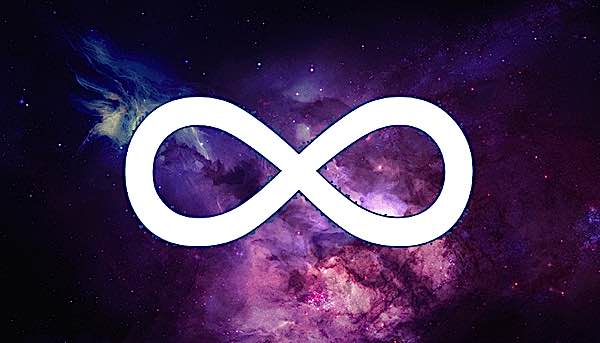
Buddha Didn’t Answer For Good Reason
In other words, Buddha didn’t answer these questions for good reasons.
Fortunately, Venerable Malunkyaputta was “delighted in the Blessed One’s words” and did not disrobe as he had threatened.
Cula-Malunkyovada Sutta: The Shorter Instructions to Malunkya
translated from the Pali by
Thanissaro Bhikkhu
© 1998, licensed under Creative Commons [1]
I have heard that on one occasion the Blessed One was staying near Savatthi at Jeta’s Grove, Anathapindika’s monastery. Then, as Ven. Malunkyaputta was alone in seclusion, this train of thought arose in his awareness: “These positions that are undeclared, set aside, discarded by the Blessed One — ‘The cosmos is eternal,’ ‘The cosmos is not eternal,’ ‘The cosmos is finite,’ ‘The cosmos is infinite,’ ‘The soul & the body are the same,’ ‘The soul is one thing and the body another,’ ‘After death a Tathagata exists,’ ‘After death a Tathagata does not exist,’ ‘After death a Tathagata both exists & does not exist,’ ‘After death a Tathagata neither exists nor does not exist’ — I don’t approve, I don’t accept that the Blessed One has not declared them to me. I’ll go ask the Blessed One about this matter. If he declares to me that ‘The cosmos is eternal,’ that ‘The cosmos is not eternal,’ that ‘The cosmos is finite,’ that ‘The cosmos is infinite,’ that ‘The soul & the body are the same,’ that ‘The soul is one thing and the body another,’ that ‘After death a Tathagata exists,’ that ‘After death a Tathagata does not exist,’ that ‘After death a Tathagata both exists & does not exist,’ or that ‘After death a Tathagata neither exists nor does not exist,’ then I will live the holy life under him. If he does not declare to me that ‘The cosmos is eternal,’… or that ‘After death a Tathagata neither exists nor does not exist,’ then I will renounce the training and return to the lower life.”
Then, when it was evening, Ven. Malunkyaputta arose from seclusion and went to the Blessed One. On arrival, having bowed down, he sat to one side. As he was sitting there he said to the Blessed One, “Lord, just now, as I was alone in seclusion, this train of thought arose in my awareness: ‘These positions that are undeclared, set aside, discarded by the Blessed One… I don’t approve, I don’t accept that the Blessed One has not declared them to me. I’ll go ask the Blessed One about this matter. If he declares to me that “The cosmos is eternal,”… or that “After death a Tathagata neither exists nor does not exist,” then I will live the holy life under him. If he does not declare to me that “The cosmos is eternal,”… or that “After death a Tathagata neither exists nor does not exist,” then I will renounce the training and return to the lower life.’
“Lord, if the Blessed One knows that ‘The cosmos is eternal,’ then may he declare to me that ‘The cosmos is eternal.’ If he knows that ‘The cosmos is not eternal,’ then may he declare to me that ‘The cosmos is not eternal.’ But if he doesn’t know or see whether the cosmos is eternal or not eternal, then, in one who is unknowing & unseeing, the straightforward thing is to admit, ‘I don’t know. I don’t see.’… If he doesn’t know or see whether after death a Tathagata exists… does not exist… both exists & does not exist… neither exists nor does not exist,’ then, in one who is unknowing & unseeing, the straightforward thing is to admit, ‘I don’t know. I don’t see.'”
“Malunkyaputta, did I ever say to you, ‘Come, Malunkyaputta, live the holy life under me, and I will declare to you that ‘The cosmos is eternal,’ or ‘The cosmos is not eternal,’ or ‘The cosmos is finite,’ or ‘The cosmos is infinite,’ or ‘The soul & the body are the same,’ or ‘The soul is one thing and the body another,’ or ‘After death a Tathagata exists,’ or ‘After death a Tathagata does not exist,’ or ‘After death a Tathagata both exists & does not exist,’ or ‘After death a Tathagata neither exists nor does not exist’?”
“No, lord.”
“And did you ever say to me, ‘Lord, I will live the holy life under the Blessed One and [in return] he will declare to me that ‘The cosmos is eternal,’ or ‘The cosmos is not eternal,’ or ‘The cosmos is finite,’ or ‘The cosmos is infinite,’ or ‘The soul & the body are the same,’ or ‘The soul is one thing and the body another,’ or ‘After death a Tathagata exists,’ or ‘After death a Tathagata does not exist,’ or ‘After death a Tathagata both exists & does not exist,’ or ‘After death a Tathagata neither exists nor does not exist’?”
“No, lord.”
“Then that being the case, foolish man, who are you to be claiming grievances/making demands of anyone?
“Malunkyaputta, if anyone were to say, ‘I won’t live the holy life under the Blessed One as long as he does not declare to me that “The cosmos is eternal,”… or that “After death a Tathagata neither exists nor does not exist,”‘ the man would die and those things would still remain undeclared by the Tathagata.
“It’s just as if a man were wounded with an arrow thickly smeared with poison. His friends & companions, kinsmen & relatives would provide him with a surgeon, and the man would say, ‘I won’t have this arrow removed until I know whether the man who wounded me was a noble warrior, a brahman, a merchant, or a worker.’ He would say, ‘I won’t have this arrow removed until I know the given name & clan name of the man who wounded me… until I know whether he was tall, medium, or short… until I know whether he was dark, ruddy-brown, or golden-colored… until I know his home village, town, or city… until I know whether the bow with which I was wounded was a long bow or a crossbow… until I know whether the bowstring with which I was wounded was fiber, bamboo threads, sinew, hemp, or bark… until I know whether the shaft with which I was wounded was wild or cultivated… until I know whether the feathers of the shaft with which I was wounded were those of a vulture, a stork, a hawk, a peacock, or another bird… until I know whether the shaft with which I was wounded was bound with the sinew of an ox, a water buffalo, a langur, or a monkey.’ He would say, ‘I won’t have this arrow removed until I know whether the shaft with which I was wounded was that of a common arrow, a curved arrow, a barbed, a calf-toothed, or an oleander arrow.’ The man would die and those things would still remain unknown to him.
“In the same way, if anyone were to say, ‘I won’t live the holy life under the Blessed One as long as he does not declare to me that ‘The cosmos is eternal,’… or that ‘After death a Tathagata neither exists nor does not exist,’ the man would die and those things would still remain undeclared by the Tathagata.
“Malunkyaputta, it’s not the case that when there is the view, ‘The cosmos is eternal,’ there is the living of the holy life. And it’s not the case that when there is the view, ‘The cosmos is not eternal,’ there is the living of the holy life. When there is the view, ‘The cosmos is eternal,’ and when there is the view, ‘The cosmos is not eternal,’ there is still the birth, there is the aging, there is the death, there is the sorrow, lamentation, pain, despair, & distress whose destruction I make known right in the here & now.
“It’s not the case that when there is the view, ‘The cosmos is finite,’ there is the living of the holy life. And it’s not the case that when there is the view, ‘The cosmos is infinite,’ there is the living of the holy life. When there is the view, ‘The cosmos is finite,’ and when there is the view, ‘The cosmos is infinite,’ there is still the birth, there is the aging, there is the death, there is the sorrow, lamentation, pain, despair, & distress whose destruction I make known right in the here & now.
“It’s not the case that when there is the view, ‘The soul & the body are the same,’ there is the living of the holy life. And it’s not the case that when there is the view, ‘The soul is one thing and the body another,’ there is the living of the holy life. When there is the view, ‘The soul & the body are the same,’ and when there is the view, ‘The soul is one thing and the body another,’ there is still the birth, there is the aging, there is the death, there is the sorrow, lamentation, pain, despair, & distress whose destruction I make known right in the here & now.
“It’s not the case that when there is the view, ‘After death a Tathagata exists,’ there is the living of the holy life. And it’s not the case that when there is the view, ‘After death a Tathagata does not exist,’ there is the living of the holy life. And it’s not the case that when there is the view, ‘After death a Tathagata both exists & does not exist,’ there is the living of the holy life. And it’s not the case that when there is the view, ‘After death a Tathagata neither exists nor does not exist’ there is the living of the holy life. When there is the view, ‘After death a Tathagata exists’… ‘After death a Tathagata does not exist’… ‘After death a Tathagata both exists & does not exist’… ‘After death a Tathagata neither exists nor does not exist,’ there is still the birth, there is the aging, there is the death, there is the sorrow, lamentation, pain, despair, & distress whose destruction I make known right in the here & now.
“So, Malunkyaputta, remember what is undeclared by me as undeclared, and what is declared by me as declared. And what is undeclared by me? ‘The cosmos is eternal,’ is undeclared by me. ‘The cosmos is not eternal,’ is undeclared by me. ‘The cosmos is finite’… ‘The cosmos is infinite’… ‘The soul & the body are the same’… ‘The soul is one thing and the body another’… ‘After death a Tathagata exists’… ‘After death a Tathagata does not exist’… ‘After death a Tathagata both exists & does not exist’… ‘After death a Tathagata neither exists nor does not exist,’ is undeclared by me.
“And why are they undeclared by me? Because they are not connected with the goal, are not fundamental to the holy life. They do not lead to disenchantment, dispassion, cessation, calming, direct knowledge, self-awakening, Unbinding. That’s why they are undeclared by me.
“And what is declared by me? ‘This is stress,’ is declared by me. ‘This is the origination of stress,’ is declared by me. ‘This is the cessation of stress,’ is declared by me. ‘This is the path of practice leading to the cessation of stress,’ is declared by me. And why are they declared by me? Because they are connected with the goal, are fundamental to the holy life. They lead to disenchantment, dispassion, cessation, calming, direct knowledge, self-awakening, Unbinding. That’s why they are declared by me.
“So, Malunkyaputta, remember what is undeclared by me as undeclared, and what is declared by me as declared.”
That is what the Blessed One said. Gratified, Ven. Malunkyaputta delighted in the Blessed One’s words.
NOTES:
[1] “Cula-Malunkyovada Sutta: The Shorter Instructions to Malunkya” (MN 63), translated from the Pali by Thanissaro Bhikkhu. Access to Insight (Legacy Edition), 30 November 2013
[2] Zen Keys (Three Leaves Press), p. 42, Thich Naht Hanh and Philip Kapleau. ISBN 9780385475617
[3] Universe Today
[4] Business Insider: “An Oxford Mathematician explains who time existed before the Big Bang”
More articles by this author
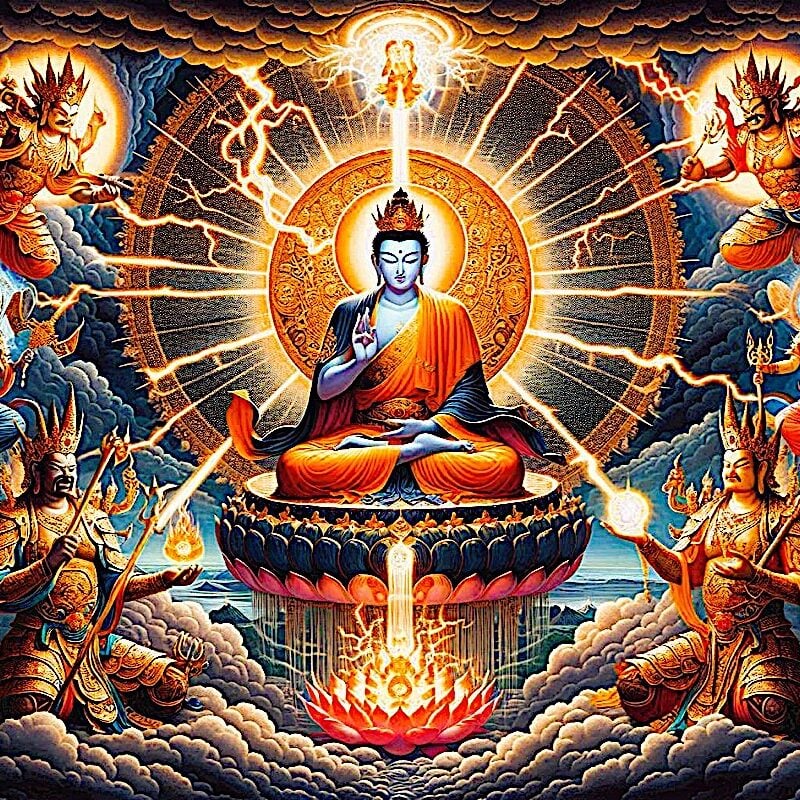
Protection from all Harm, Natural Disaster, Weather, Spirits, Evil, Ghosts, Demons, Obstacles: Golden Light Sutra: Chapter 14
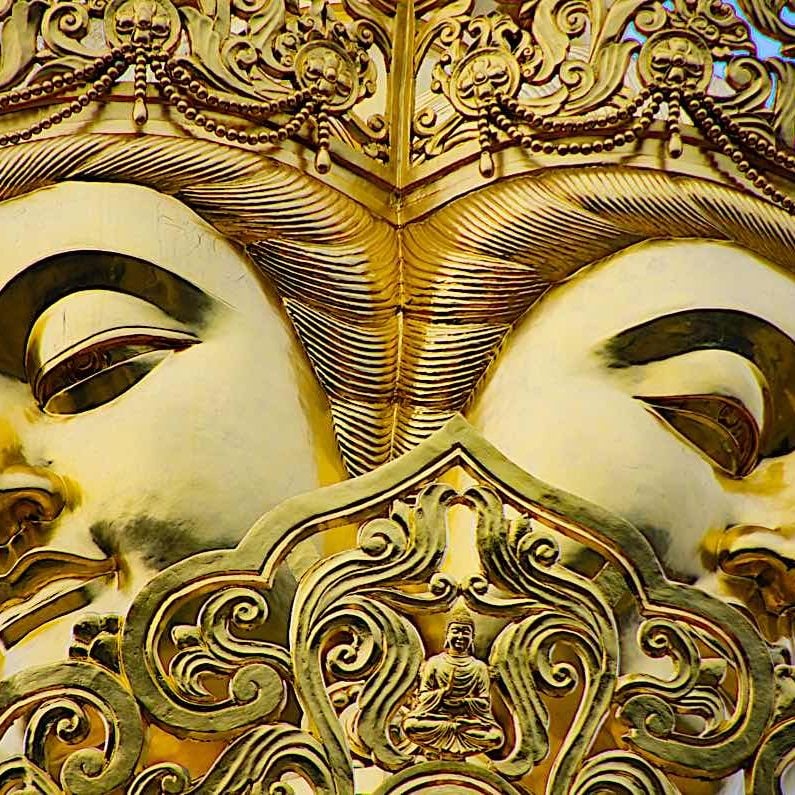
Samantabhadra’s The King of Prayers is the ultimate Buddhist practice how-to and itself a complete practice
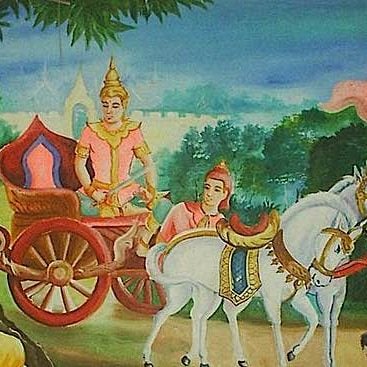
The Five Strengths and Powers or pañcabalā in Buddhism — the qualities conducive to Enlightenment: faith, energy, mindfulness, concentration and wisdom
Search
Latest Features
Please support the "Spread the Dharma" mission as one of our heroic Dharma Supporting Members, or with a one-time donation.
Please Help Support the “Spread the Dharma” Mission!

Be a part of the noble mission as a supporting member or a patron, or a volunteer contributor of content.
The power of Dharma to help sentient beings, in part, lies in ensuring access to Buddha’s precious Dharma — the mission of Buddha Weekly. We can’t do it without you!
A non-profit association since 2007, Buddha Weekly published many feature articles, videos, and, podcasts. Please consider supporting the mission to preserve and “Spread the Dharma." Your support as either a patron or a supporting member helps defray the high costs of producing quality Dharma content. Thank you! Learn more here, or become one of our super karma heroes on Patreon.
Lee Kane
Author | Buddha Weekly
Lee Kane is the editor of Buddha Weekly, since 2007. His main focuses as a writer are mindfulness techniques, meditation, Dharma and Sutra commentaries, Buddhist practices, international perspectives and traditions, Vajrayana, Mahayana, Zen. He also covers various events.
Lee also contributes as a writer to various other online magazines and blogs.






